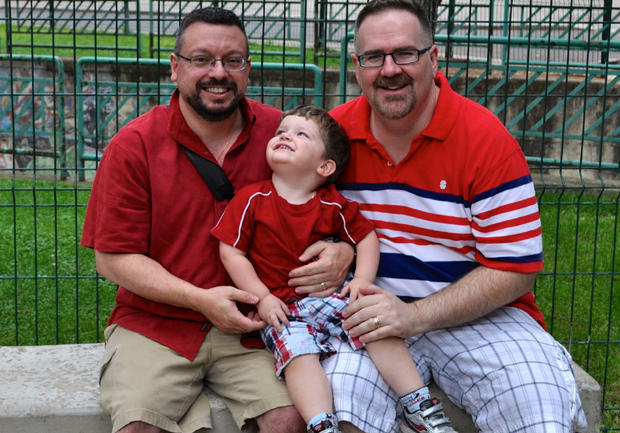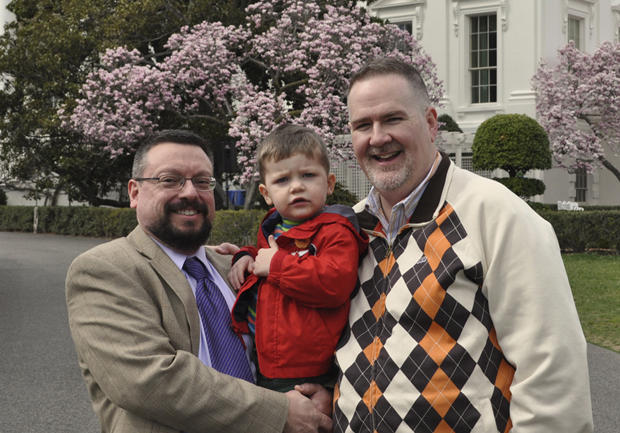Are two dads better than one?
In many ways, Jon Pirulli-Almond enjoyed a pretty typical afternoon last Saturday. He chilled out in his red wagon. He played with a new Batman toy. He squirted his parents (and passersby) with a water pistol.
But there was nothing ordinary about the venue - or the boy's attire. It's a safe bet that Jon was the only 3-year-old in Washington, D.C. frolicking at a gay pride parade while wearing a shirt emblazoned with the message: "My Two Daddies (Can Beat Up Your One)."
His two fathers (Brent Almond, known as "Daddy" to John) and Nicholas Pirulli (aka "Papa") proudly hoisted their son, who was winning over the crowd with both his fashion message and his squirt gun prowess.
"It was so affirming and encouraging to hear everyone cheer when (we) walked by, and I've never gotten so many high-fives in my life," Almond said. "It was hard to stop smiling throughout the whole march."
Almond, a 44-year-old graphic designer, and Pirulli, a 46-year-old attorney, are among a small but growing number of same-sex parents in this country. According to the Center for Family and Demographic Research, about one in six same-sex households include children. There are reportedly almost 2 million U.S. children being raised by same-sex parents, many of them in states that don't allow gays to marry.
Almond and Pirulli, who had a commitment ceremony in 2003, are hoping to legally marry later this year. "I don't know that being legally married will change our day-to-day lives, but it will be nice to know there are safeguards in place, just in case," Almond said. "It will be especially neat to have Jon involved."
With same-sex marriage gaining momentum (a recent poll shows a slim majority of Americans support it and 12 states now allow it), same-sex parenting has become a hot-button topic - even at the highest levels of the U.S. judicial system. When the Supreme Court took up the issue of same-sex marriage in March, Justice Antonin Scalia claimed that experts were debating whether raising a child in a single-sex family is "harmful to the child or not."
Scalia may have been alluding to a 2012 study conducted by Mark Regnerus, a University of Texas at Austin professor who found that children of a gay or lesbian parent may be more likely to have social and emotional problems.
But that conclusion is false, according to experts. The methodology of Regnerus' study waswidely criticized by sociologists and even his own colleagues called it "bad science."
"The preponderance of the available evidence is that children of same-sex parents turn out just as well as other kids," said Debra Umberson, a sociology professor at University of Texas at Austin.
The social science on same-sex parenting is limited but some of the existing evidence is compelling. University of Virginia psychologist Charlotte Patterson recently invited both straight and same-sex couples to play with their respective children on a blanket with toys. Video showed that same-sex parents were more collaborative and egalitarian in their interactions with their children, while heterosexual parents retreated to conventional roles - mothers were more interactive while fathers were content to just play with the toys themselves.
Almond says he's not surprised by the study. He recounted a time he passed by a toddler soccer league and saw all the dads huddled on the sidelines and all the moms sequestered under the trees. Gay parents, he said, generally don't restrict themselves to one role.
"I can hang with the moms in the kitchen or I can go hang out with the dads on the sidelines depending on what my kid needs me for," he said.
When it comes to the well-being of kids, experts say stability and money trump sexual orientation. Susan Brown, a sociology professor at Bowling Green University, said that children fare better when their parents don't have to worry about basic financial needs and are in a committed relationship. To that end, marriage is key.
"Marriage has symbolic value as a public statement and public union," Brown said. "So (same-sex) marriage stands to enhance a child's well-being."
In March, the American Academy of Pediatrics officially endorsed same-sex marriage, citing researchshowing that parents' sexual orientation has no bearing on a child's well-being. The policy said that if two same-sex parents want to marry, "it is in the best interests of their children that legal and social institutions allow and support them to do so."
The Supreme Court is expected to rule on same-sex marriage cases this month.
Almond and Pirulli, who have been together for almost two decades, took methodical steps so they could adopt. Anticipating the home study process, they moved from D.C. to the suburbs to get a house, a big yard and a dog. They chose Maryland over Virginia because the latter does not allow unmarried couples to adopt.
The process was long and gut-wrenching. They were matched quickly with a mother but she changed her mind two days before the couple was supposed to be united with the baby. In adoption parlance, that's called a "disruption." Pirulli called it devastating.
"Brent had never seen me cry before that," Pirulli said of the ordeal.
They were then referred to an attorney in Portland, Ore., who found a match in 2009. The mother went into labor a month early and the couple caught the first plane to the Pacific Northwest. That night, they met Jon just a few hours after his birth and spent the night with him in the hospital. There was no maternal change of heart this time and the couple has had Jon ever since.
On their son's first birthday, Almond launched a blog "Designer Daddy," where he riffs on everything from "cool toys and doodads" to being an adoptive parent and gay father. He has since joined a father bloggers group where he commiserates with other men about the struggles of raising a three-year-old.
He has even taken classes on parenting, including one called "Managing Anger" - a class, Almond says, made up almost entirely of toddler parents.
"As a gay dad, I don't have a lot of peers, so these classes and the dad bloggers group have helped me establish my community of peers," Almond said.
While Almond and Pirulli say that most of the parenting challenges they face have nothing to do with their sexual orientation, both admit that they worry about what Jon might encounter as the adopted son of two gay men.
"Kids can be cruel," Pirulli said.
Pondering that hypothetical scenario, Almond decided to arm his son with lyrics to fend off any potential bullies. And so he wrote the song, "My Two Daddies (Can Beat Up Your One)" - the battle cry of a picked-on kid proclaiming that "some folks may get fretful or not understand my life but my parents love each other... There just ain't no wife." (Watch Almond perform the song below).
Almond calls the song (which is available on iTunes and raises money for the LGBT advocacy group Family Equity Council) "a love letter to my son - with a smidge of me working through my insecurities as a father."
On Monday, the day after Father's Day, Almond and Pirulli will once again get on a plane to Portland. They will take Jon for his annual visit with his birth parents. During the trip, Jon will also spend time with his biological brother who was adopted by a foster family.
Jon's two dads used to worry about the trip - how his birth parents would perceive them and how their young son might handle it. But their insecurities have dissipated since 2009.
"We occasionally talk about adoption but he doesn't ask questions like 'Why don't I have a mom?'" Pirulli said. "But it's going to happen soon."
"I have a script I've written and I ran it by an adoption social worker," Almond said. "But we have to be confident. He's ours. Our highest priority is him."

